2023 Mitsubishi Outlander PHEV Review and Test Drive
Finally, a reason to revisit your nearest Mitsubishi dealership.
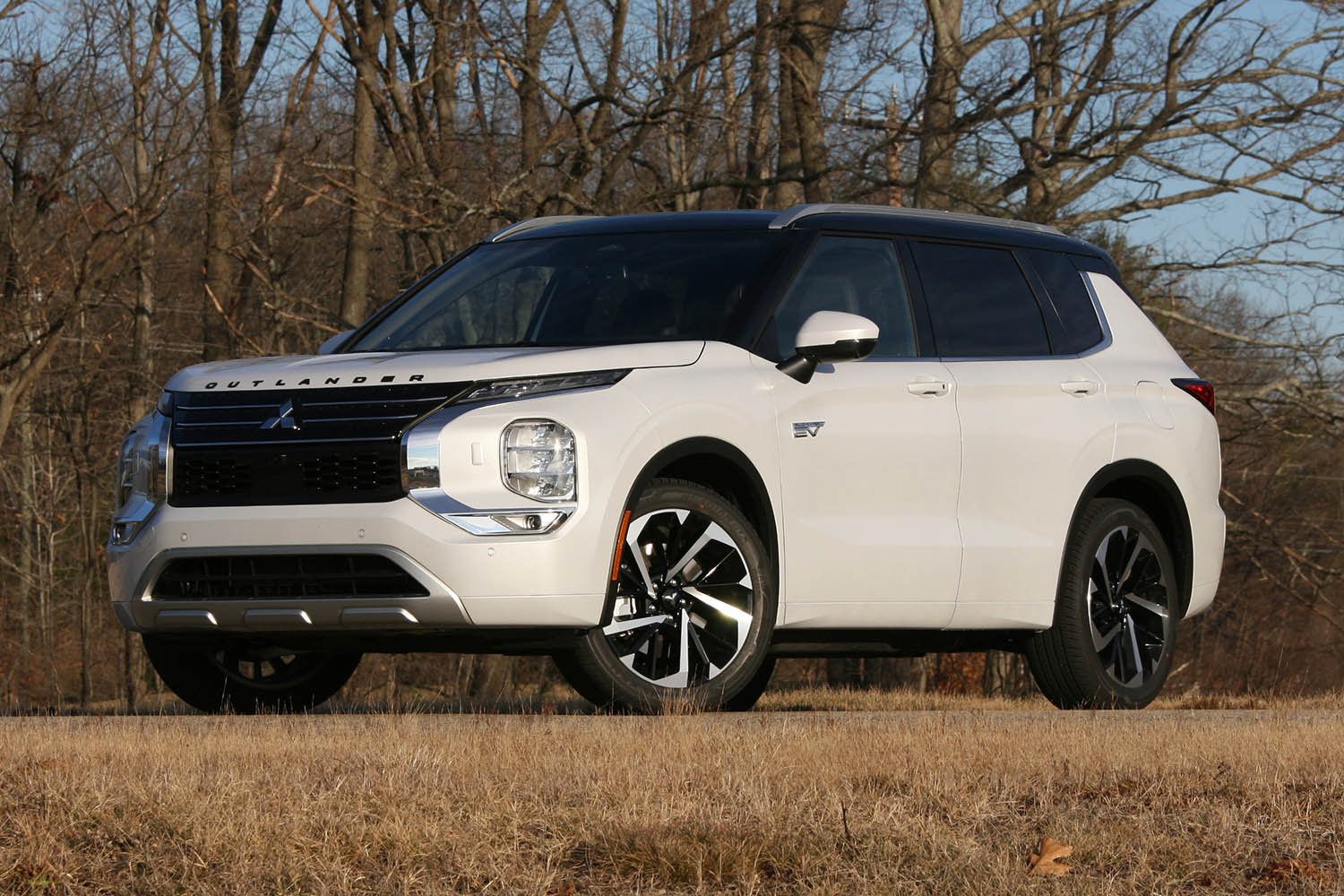 Thom Blackett
Thom Blackett
When you think of plug-in hybrid electric vehicles (PHEVs), brands like Ford and Toyota might first come to mind. With its Outlander PHEV, Mitsubishi is likely near the end of the list if it makes it at all. That's understandable, given the automaker's decline in popularity in the U.S. market. However, today Nissan owns a controlling interest in Mitsubishi and, thanks to this partnership, a completely redesigned Outlander debuted in 2022. This year, an all-new 2023 Mitsubishi Outlander PHEV arrives.
I can't overstate the importance to Mitsubishi of this new model, as the automaker noted when the vehicle debuted: "When sales begin in the U.S., the 2023 Outlander PHEV will take its place as the flagship of the Mitsubishi fleet. It is the most advanced and best-equipped vehicle we have ever sold, and it is the perfect blend of quiet and clean electric motoring with the range and ease of refueling of a gasoline-powered vehicle."
Despite competing with rivals like the Ford Escape PHEV, Hyundai Santa Fe PHEV, Kia Sorento PHEV, and Toyota RAV4 Prime, the redesigned seven-seat Outlander PHEV has quickly reached center stage. As proof, Green Car Journal named this crossover its
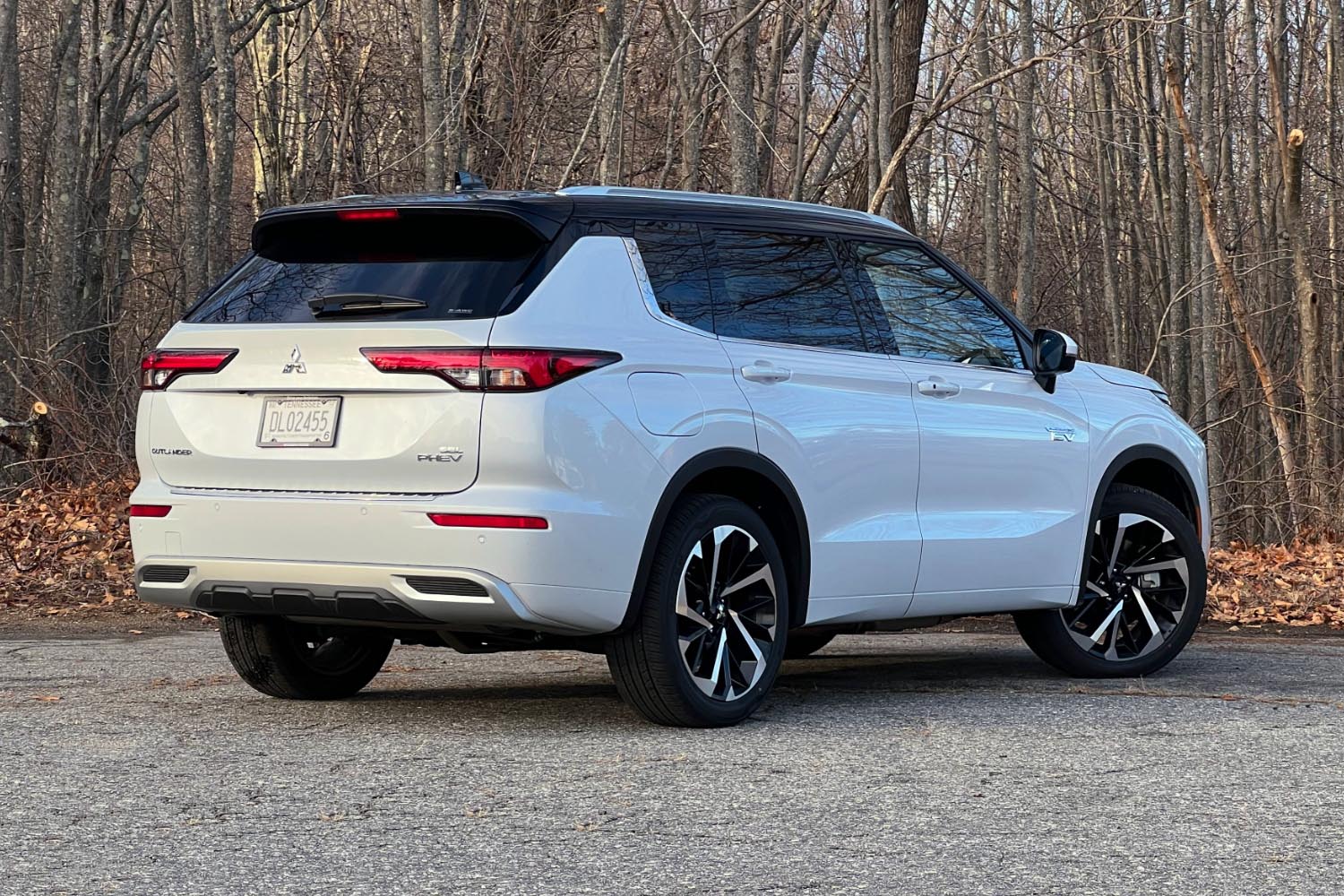 Thom Blackett
Thom Blackett
Mitsubishi offers the 2023 Outlander PHEV in four primary trim levels: ES, SE, SEL, and 40th Anniversary. There is a Technology package available for the SE, while the SEL offers available Touring and Premium packages. All Outlander PHEVs have Mitsubishi's Super All-Wheel Control (S-AWC) all-wheel-drive system. Base prices range from the low $40,000s to the low $50,000s, including the destination charge to ship the crossover SUV from the Okazaki, Japan, factory that builds it to your local dealership.
For this Outlander PHEV review, I test-drove the SEL in southern New England. It came with extra-cost White Diamond paint coupled with a black roof, the SEL Premium package, a Welcome package, and a rear cargo cover, bringing the manufacturer's suggested retail price (MSRP) to $50,880, including the $1,345 destination charge. Mitsubishi provided the vehicle for this Outlander PHEV review.
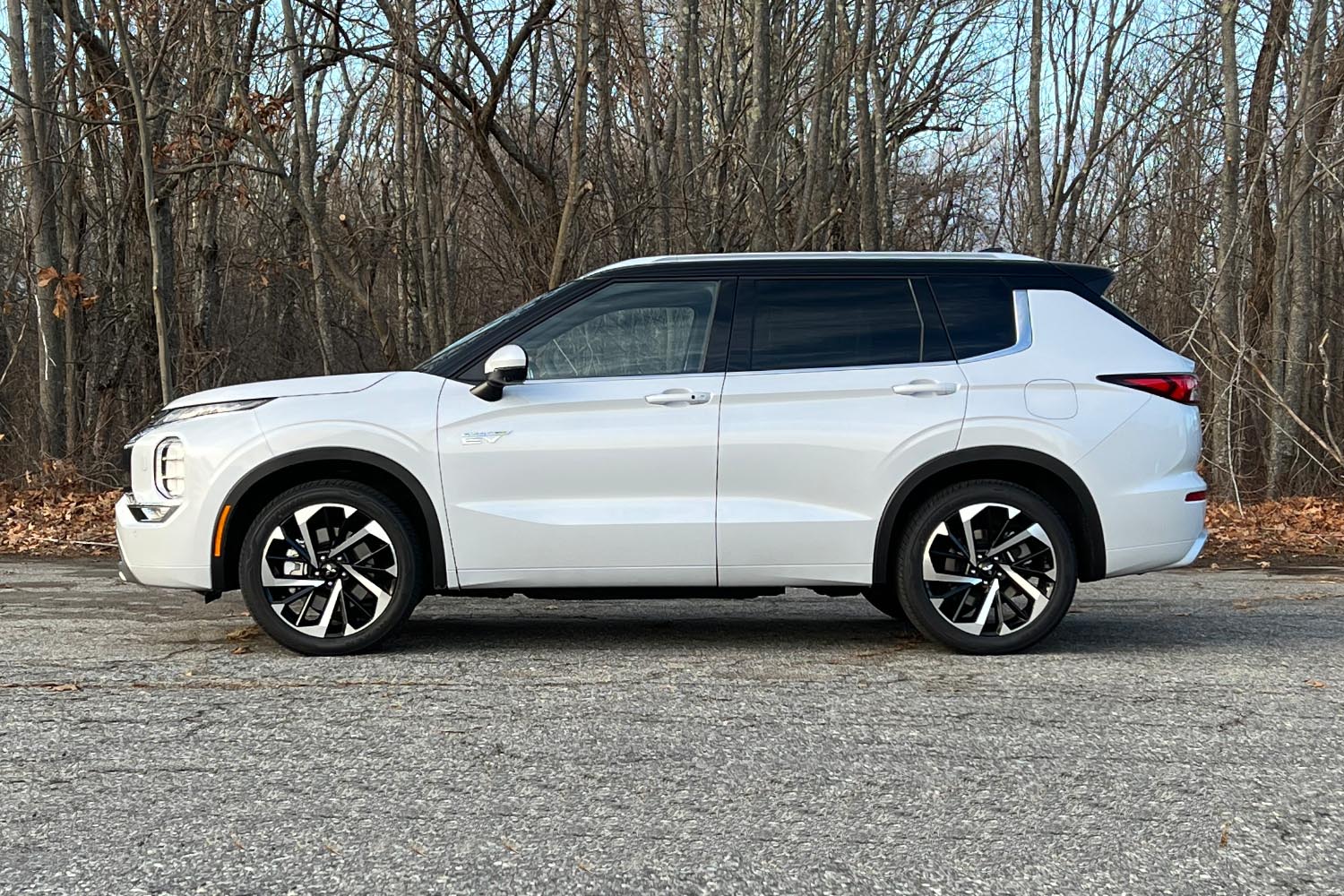 Thom Blackett
Thom Blackett
2023 Mitsubishi Outlander PHEV Review: The Design
In an apparent effort to visually differentiate their models from the growing herd of arguably anonymous-looking crossovers, designers often add more cladding, more creased bodywork, and, well, more everything. Mitsubishi uses that approach, too, but in a relatively subtle fashion. Look at the 2023 Outlander PHEV, and you'll see an attractive midsize crossover with contemporary styling. Awkwardly placed headlights serve as the only detraction.
Inside, my Outlander PHEV SEL test vehicle felt borderline luxurious. Logically placed buttons and switches have a quality feel, and soft-touch materials cover the dashboard, most of the door panels, and the sides of the center console (where you may rest your knee while driving).
Quilted semi-aniline leather upholstery, part of the SEL Premium package, adds to the upscale presentation, as does soft ambient lighting. A heated, leather-wrapped steering wheel, also included in that package, contributes to the comfort of the Outlander PHEV.
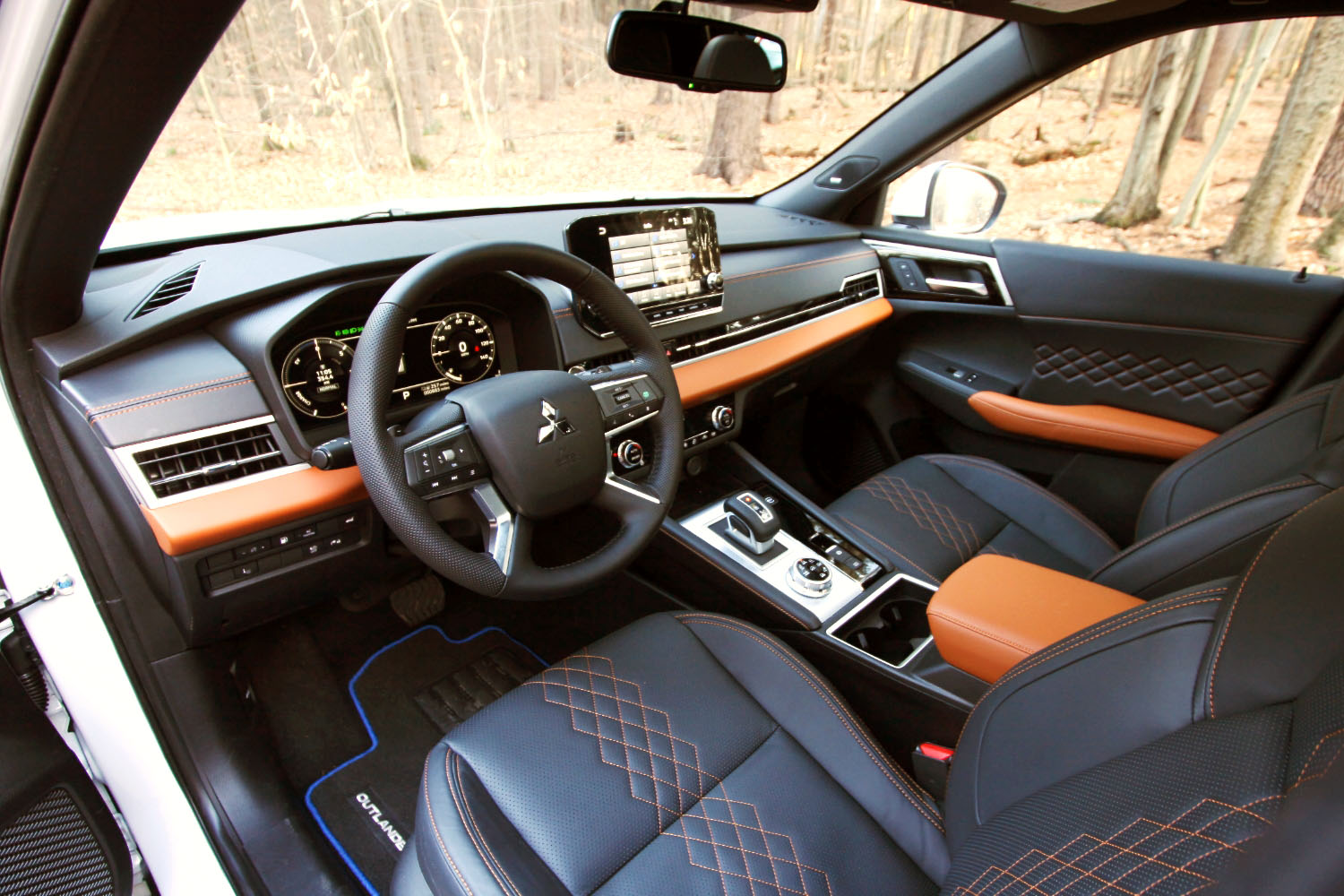 Thom Blackett
Thom Blackett
The driver's seat offers plenty of support for short and long trips. Well-padded armrests on the door panel and center console complement the chair comfort. Both front buckets provide heat and, curiously, feature a massage function activated by a button on the outer edge of the seat. Compared with genuine luxury cars, where you'll most often find this feature, the Outlander PHEV's massaging action is much less robust and largely ineffective. I prefer ventilated seats, especially when the summer sun hits that black leather.
With the driver's seat adjusted for my 5-foot 8-inch height, the sliding and reclining second-row bench seat provides plenty of space, especially when moved to its rearmost position. Passengers with longer legs will appreciate the soft front seatbacks.
While the first two rows of seats are inviting, the 2023 Mitsubishi Outlander PHEV's two-person third-row bench seat is comparatively inhospitable. With the second row configured for an average-size adult, no foot or legroom is available for third-row passengers. At least there's a decent amount of headroom (helpful if you sit crisscross apple sauce on your legs and feet).
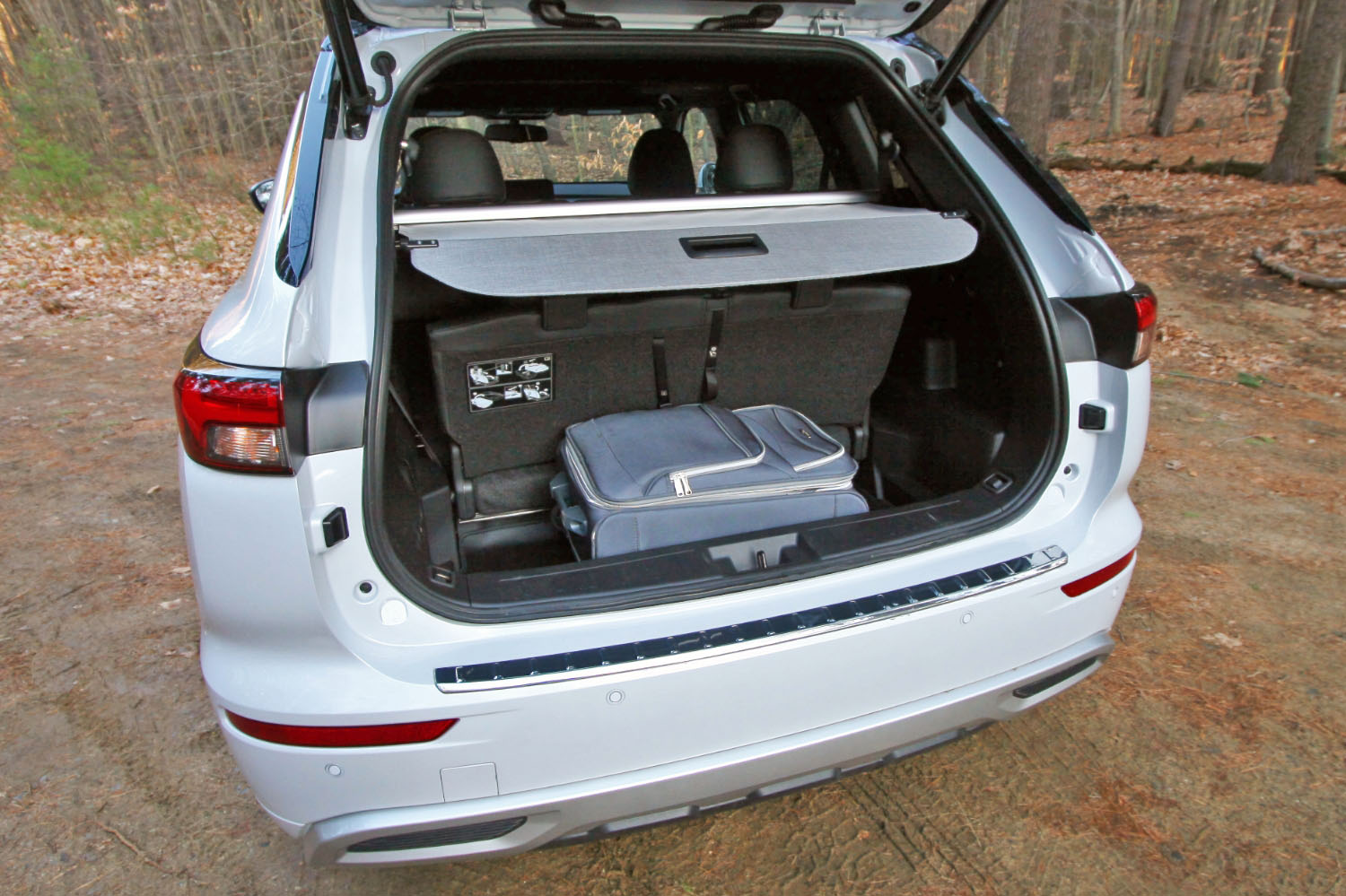 Thom Blackett
Thom Blackett
To its credit, you can fold that third-row seat flat into the cargo floor. When paired with the fold-flat second-row seat, there's 64.7 cubic feet of cargo space. However, with the third row upright, I found little more than room for a carry on. Thankfully, the Outlander PHEV offers a hands-free power liftgate and ample storage on the door panels and the front console.
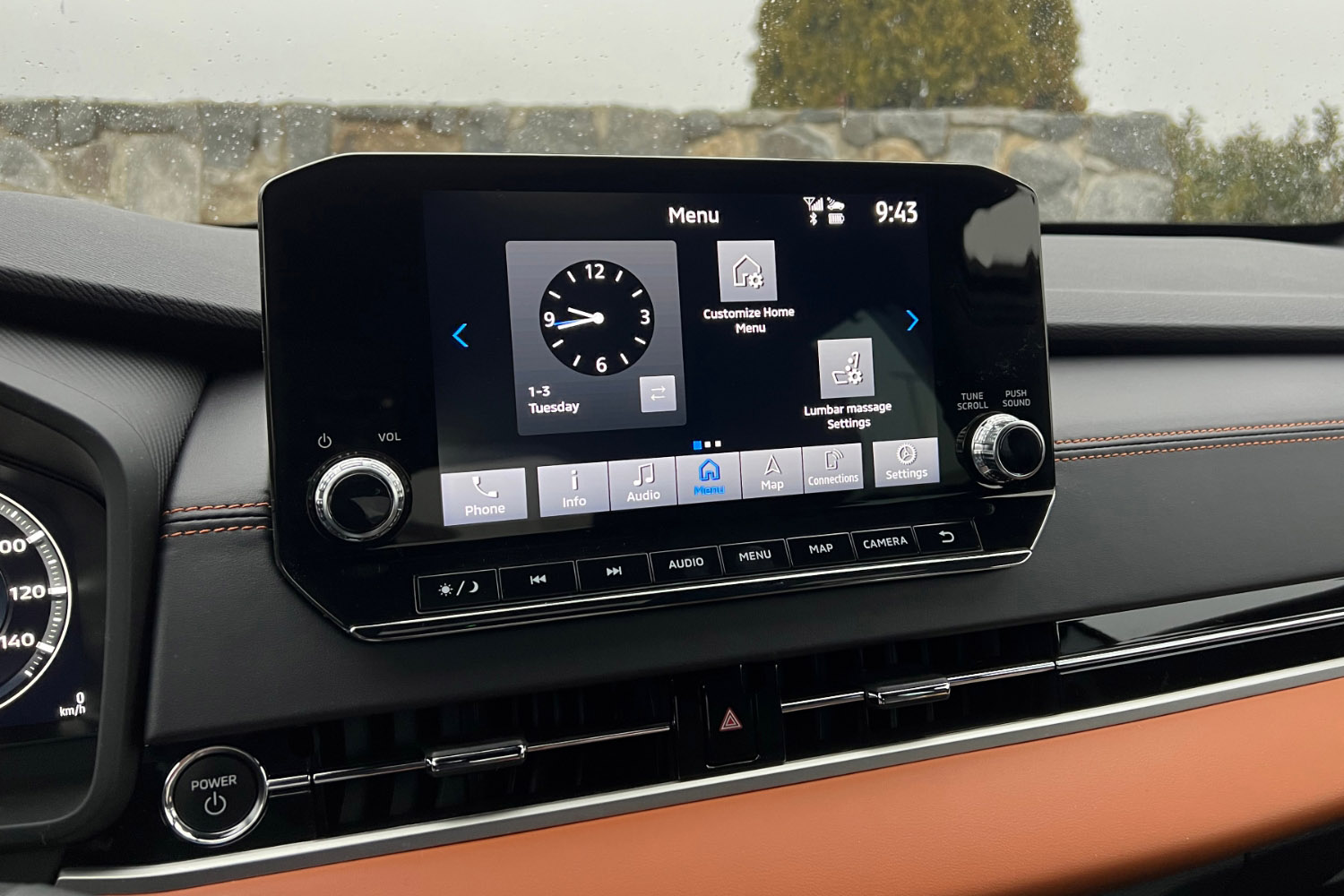 Thom Blackett
Thom Blackett
2023 Mitsubishi Outlander PHEV Review: The Technology
To be competitive today, new cars need to bring their A game in the form of useful technology that's easy to access and master. With the new Outlander PHEV, Mitsubishi aced that assignment, which says a lot coming from this Gen X technophobe.
It starts with a standard 12.3-inch digital gauge cluster controlled via traditional buttons and dials on the steering wheel. The same applies to the climate control buttons and knobs, all well-labeled and logically placed on the center of the dashboard, and the primary buttons paired with the infotainment system.
In recent years, automakers have battled to see who can incorporate the most prominent touchscreen within the dashboard, so the 9-inch display in the Outlander PHEV appears almost small by comparison. In reality, it's an ideal size. Plus, it provides excellent resolution, quickly responds to user inputs, and has nearby old-school volume and tuning knobs for those who refuse to let old habits die.
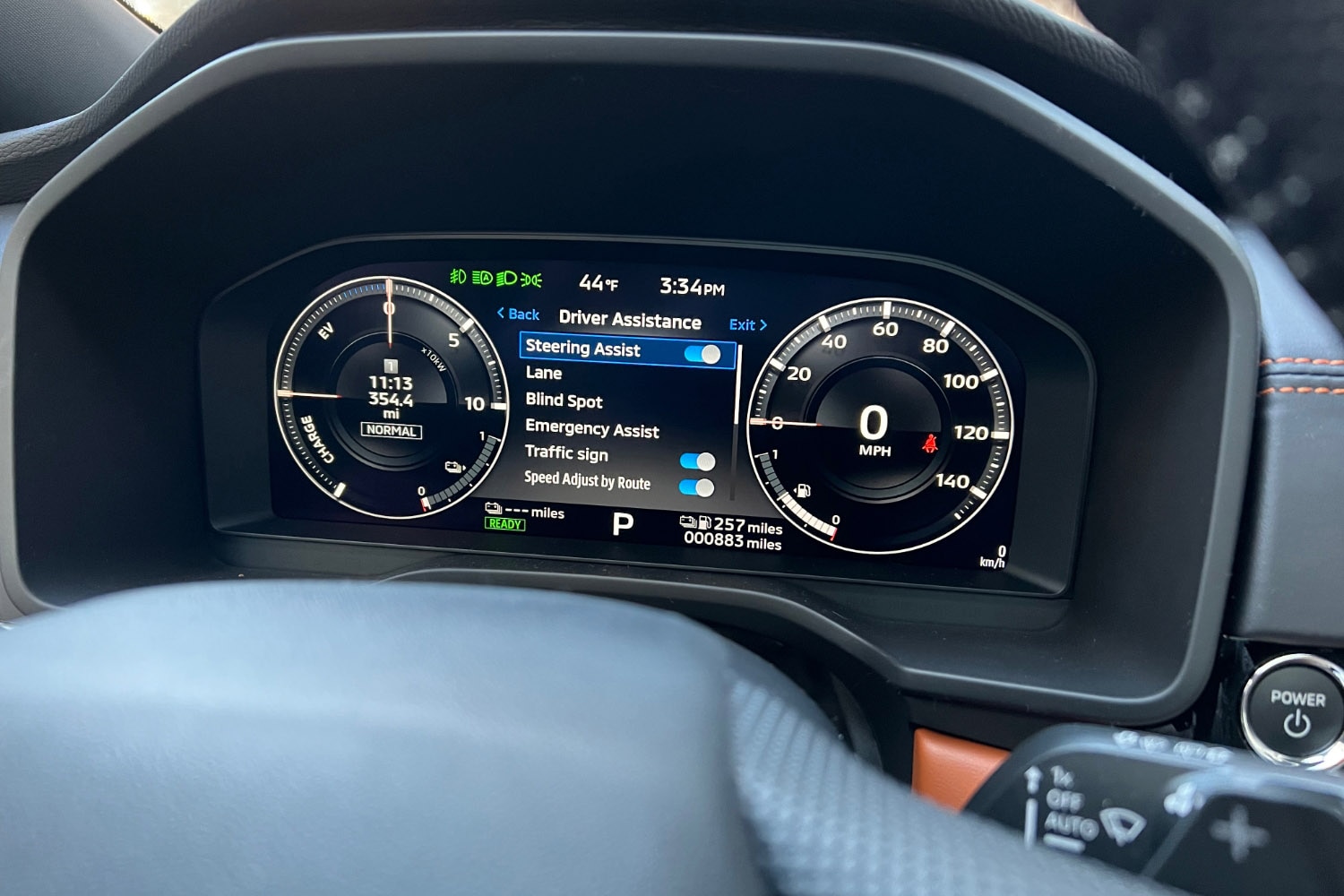 Thom Blackett
Thom Blackett
Pairing a smartphone with the Outlander PHEV's Bluetooth system is a cinch, but activating the wireless Apple CarPlay function requires an additional step. You'll need to connect with a USB cable if you have a phone that uses Android Auto.
Apple iPhone users will want to complete this setup immediately, as I learned early in my test. The problem lies with the Outlander PHEV's voice-recognition software, which requires entering multiple specific commands to accomplish basic tasks, like finding the nearest hospital or Starbucks.
Thankfully, with Apple CarPlay connected, I could use the vehicle's voice-recognition system to interact with the iPhone's Siri voice assistant and receive instant responses. One negative to this approach: using Siri for navigation will not feed turn-by-turn directions into the head-up display.
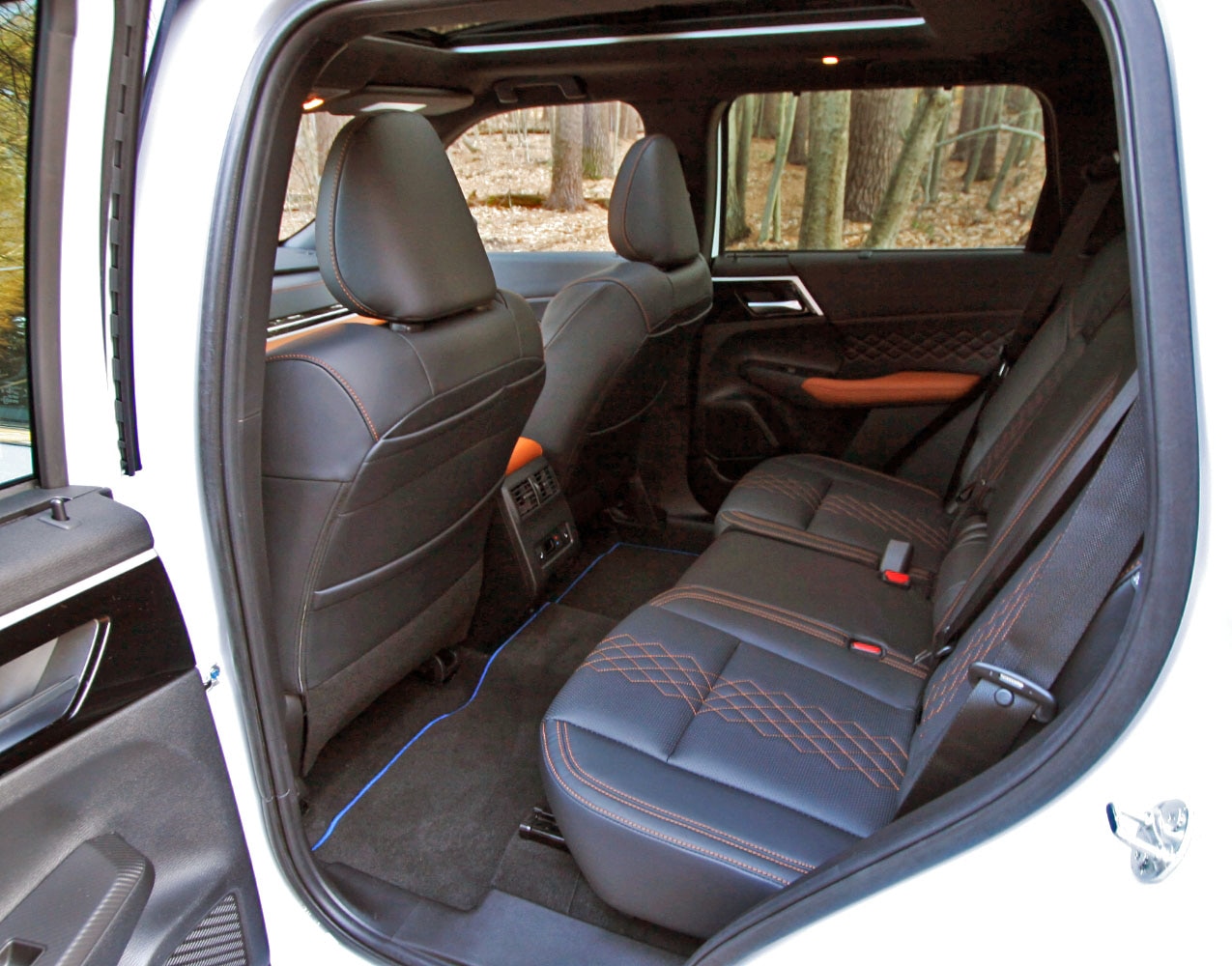 Thom Blackett
Thom Blackett
A host of safety-related features also falls under the technology umbrella. Among them is Mi-Pilot Assist, which combines adaptive cruise control with lane-centering functionality. The Level 2 system is easy to set up and use, but doesn't include lane-changing capability and is not automated (Level 3). Remove your hands from the steering wheel, and you'll hear and see alerts, after which Mi-Pilot Assist disengages, the hazard lights turn on, and the Outlander PHEV comes to a controlled stop.
Mitsubishi includes traffic-sign recognition in this bundle, too. It consists of two settings. Auto, as its name implies, automatically adjusts the vehicle's speed to match the posted limit, whereas Manual will present a message in the head-up display where you can opt to adjust your speed or not. When the system slows the vehicle, the transition is gradual, so don't worry about planting your face against the windshield when entering a 55-mph zone on the freeway.
With all these components working their magic during my test drive, I exited Interstate 95 and controlled the steering as the Outlander PHEV correctly applied accelerator and brake pressure on the off-ramp and through multiple intersections in town.
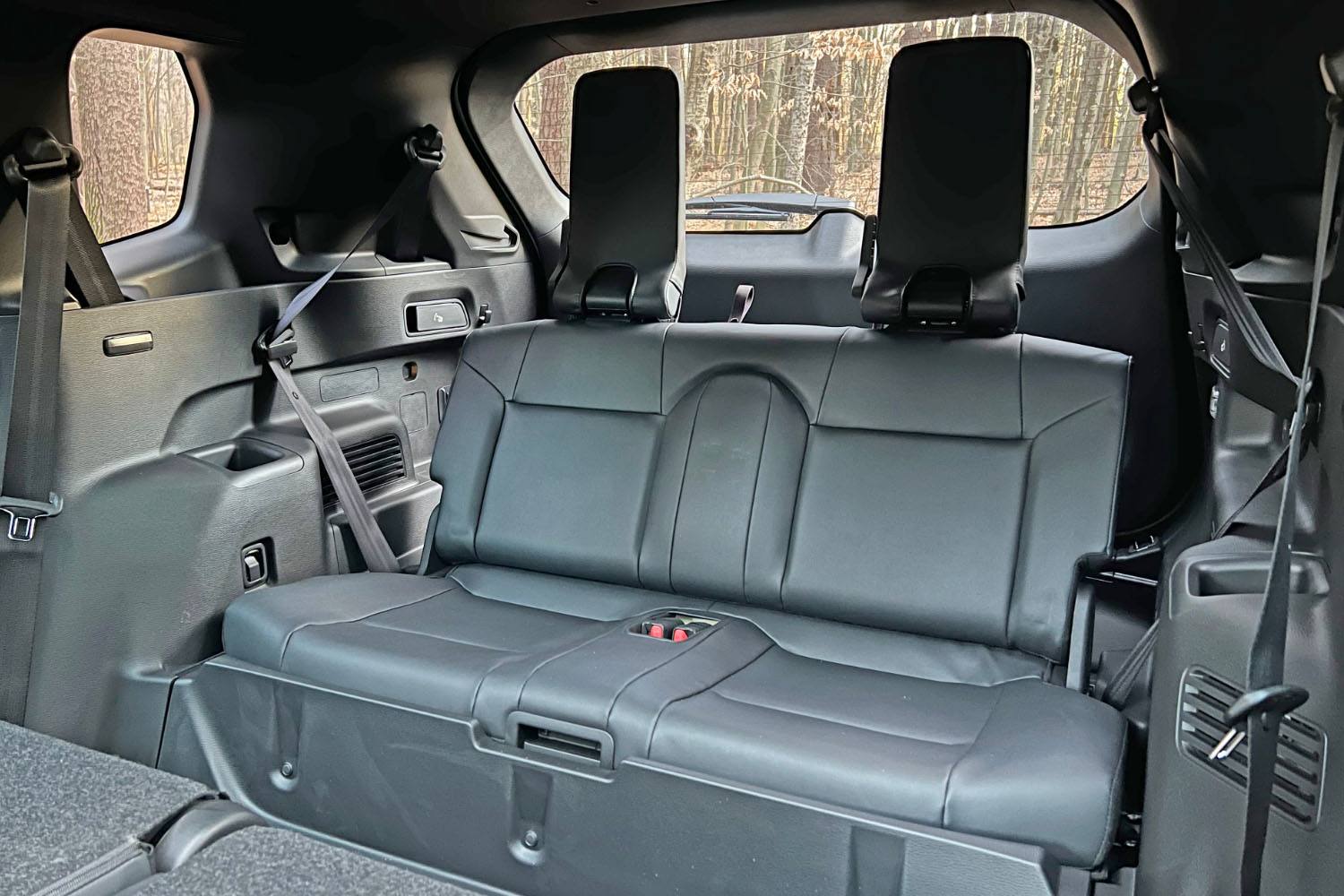 Thom Blackett
Thom Blackett
After that glowing praise, I do have one complaint. The Outlander PHEV's lane-keeping assist system, designed to alert and help the driver avoid crossing over an inner or outer lane marking, operates by vibrating the steering wheel. It also slows the vehicle slightly, an unnerving occurrence because noticeable braking isn't usually part of the process.
As I write this article, neither the National Highway Traffic Safety Administration (NHTSA) nor the Insurance Institute for Highway Safety (IIHS) has performed crash testing on the 2023 Outlander PHEV.
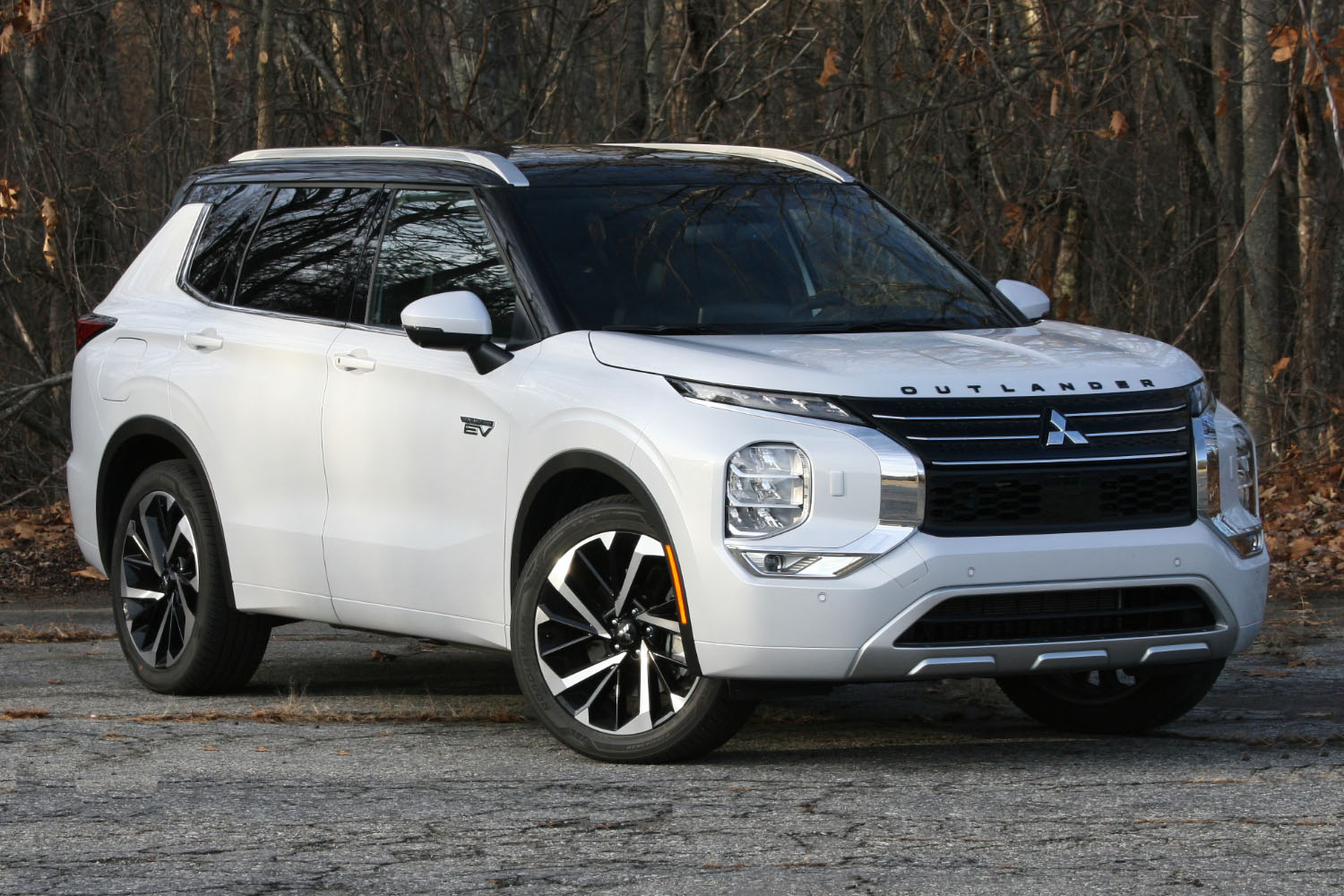 Thom Blackett
Thom Blackett
2023 Mitsubishi Outlander PHEV Review: The Drive
Like all 2023 Mitsubishi Outlander PHEV models, my SEL tester had a 2.4-liter four-cylinder engine boasting 126 horsepower and 147 lb-ft of torque. When factoring in the electric motors, Mitsubishi says combined output measures 248 hp and 332 lb-ft. The front and rear electric motors deliver output to the wheels and help recharge a 20-kWh lithium-ion battery pack.
On paper, the Outlander PHEV's power ratings are impressive. In the real world, Mitsubishi's plug-in hybrid delivers brisk acceleration, allowing you to plant the go-pedal and confidently merge onto the highway or stake a claim on a gap in traffic.
At times like this, it's not unusual for a four-cylinder engine to sound a bit raucous, but I only heard a commendable level of refinement from the Outlander PHEV. That's all positive news, though one should not consider this a sporty people-mover.
An available Tarmac drive mode marginally improves powertrain response while delivering improved handling. I noticed a bit of extra heft in the steering, but no discernable change to the suspension.
There's body lean on twisty roads, but to its credit, the 2023 Outlander PHEV's standard chassis setup offers a comfortable and compliant ride, despite the best efforts of Maine's many potholes to ruin the ride quality. As I scribbled in my test-drive notes, Mitsubishi has built a surprisingly polished family hauler.
Of course, efficiency related to the hybrid system is at the heart of the Outlander PHEV story, so let's take a look at that. As I write this review, the EPA is yet to publish official fuel-economy estimates for this model. Mitsubishi claims its plug-in crossover has a maximum electric-only range of 38 miles at 64 MPGe, and delivers 26 mpg in combined city/highway driving when operating as a conventional hybrid.
On my first drive in the SUV, the battery was nearly depleted and the trip computer showed 24.2 mpg. So, I tapped the EV button on the center console to select one of four modes: Normal, EV, Save, and Charge. I opted for the Charge setting to see how effectively it would recharge the battery while I drove.
Over 40 miles, the electric range went from zero to 9 miles, though fuel economy dropped to 23.0 mpg. From there, I chose EV mode and traveled roughly 10.5 miles before the engine kicked back on. By the end of that drive, the trip computer read 25.6 mpg.
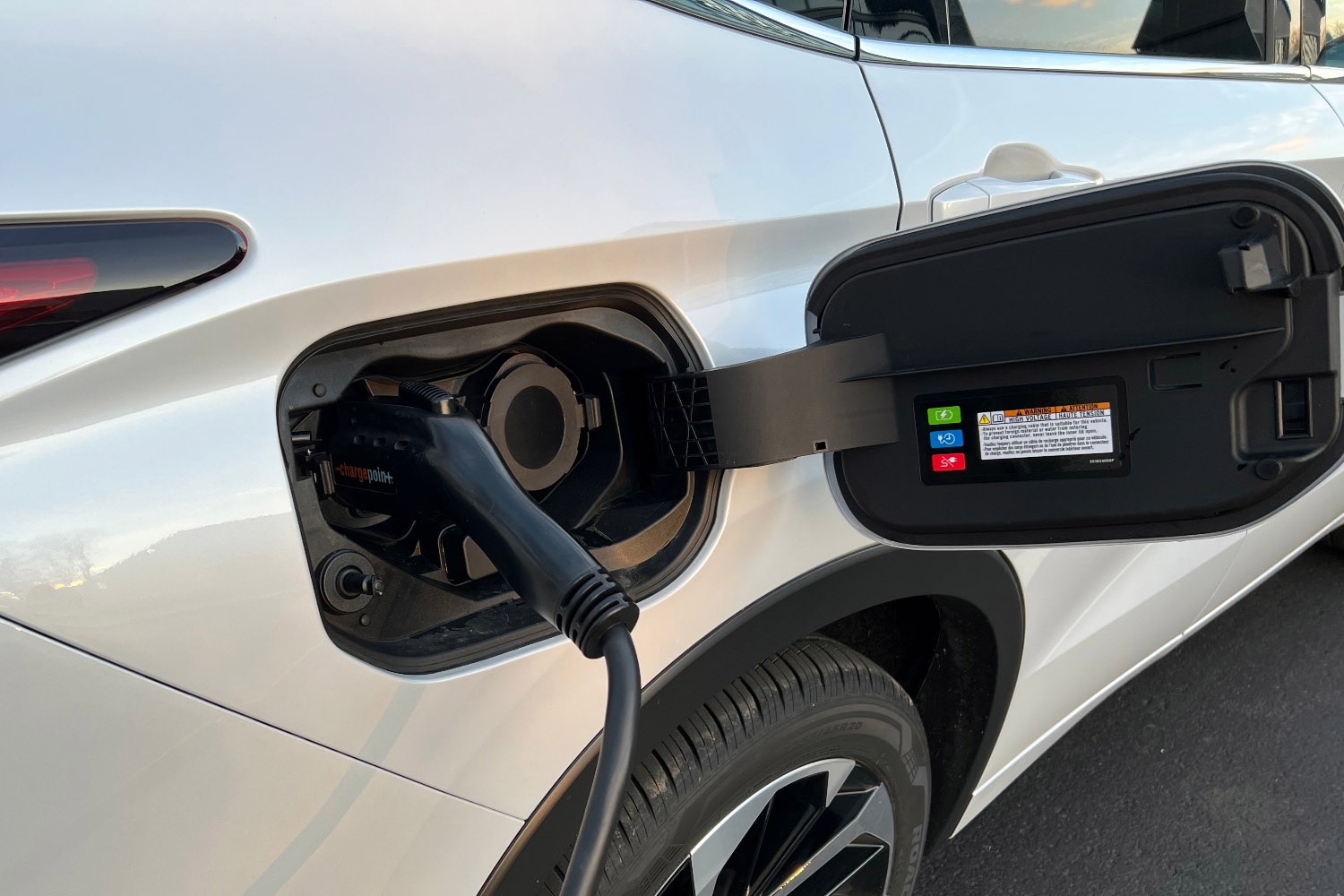 Thom Blackett
Thom Blackett
At that point, I decided to recharge the battery completely. Mitsubishi provides a charge cord, but I don't have an easy way to connect at my apartment, so I went to my usual fast-charging station just a few miles away. Unfortunately, that location uses an SAE Combo CCS level-3 connector, whereas the Outlander PHEV has J1772 level-2 and CHAdeMO level-3 built-in charge connectors.
Next, I consulted the navigation system, which directed me to an available charger in a nearby Whole Foods parking lot. It was a J1772 connector that promised to top off my battery in only 7.5 hours. Without that kind of time to spare, I eventually found my way to a station several miles away, where I knew I'd find a CHAdeMO connector.
Once I finally plugged in, I waited 37 minutes for the battery's charge to increase from 4% to 81%. Mitsubishi suggests setting aside about 38 minutes to charge a depleted battery to 80%.
When all was said and done, the Outlander PHEV showed 39 miles of electric range. Unfortunately, I traveled only 35 miles before noticing the range was back to zero. The trip computer's final reading was 27.0 mpg.
Did the plug-in hybrid system prove beneficial for me? It did not, but the experience would be different with just a few changes, not the least of which is becoming familiar with local charging stations. If I could plug in every time I returned home and had a daily commute of roughly 30 miles or less, I'd run almost exclusively on battery power, and fuel economy would be outstanding. For that scenario, the 2023 Mitsubishi Outlander PHEV makes a lot of sense.
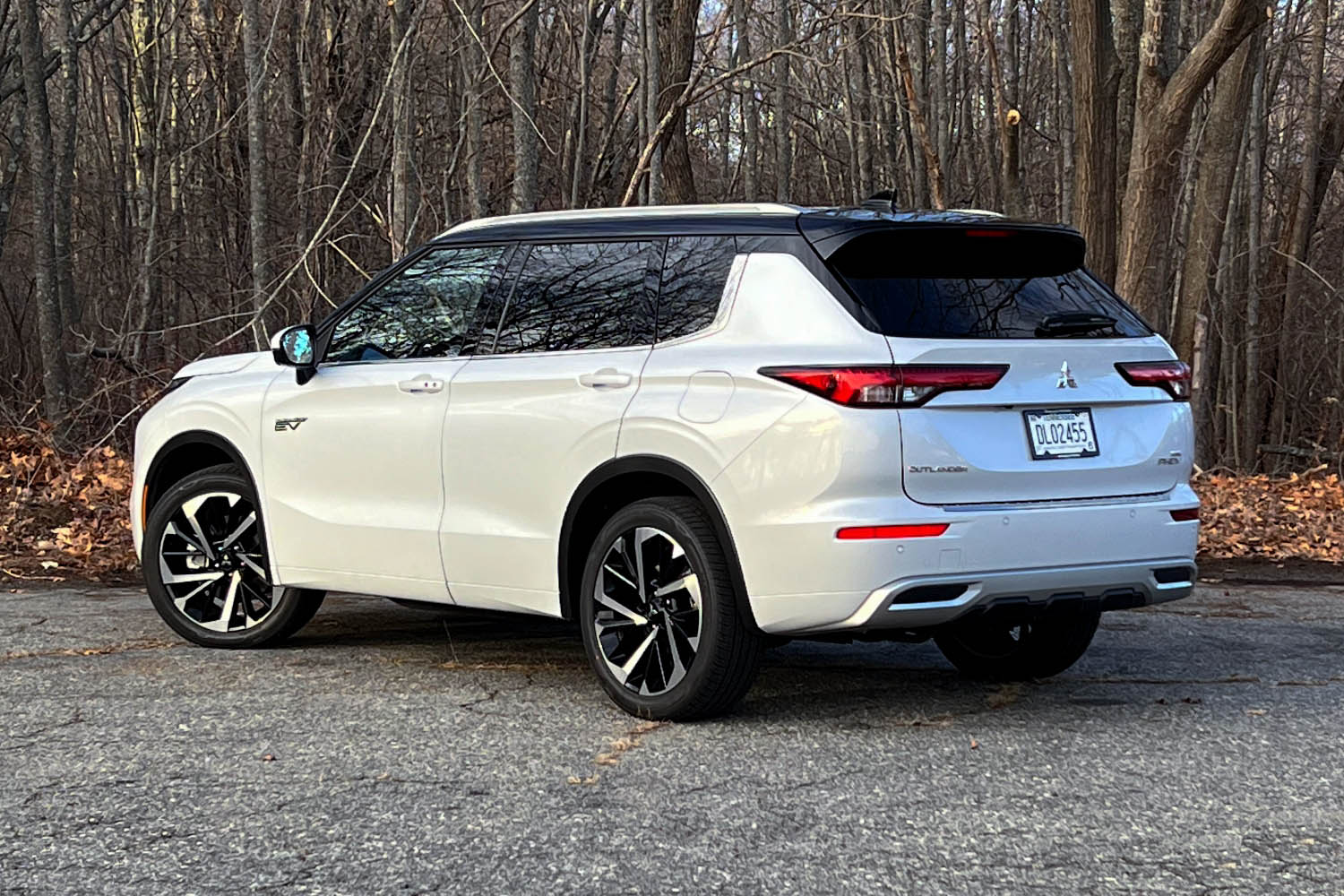 Thom Blackett
Thom Blackett
Is the 2023 Mitsubishi Outlander PHEV a Good SUV?
Since the redesigned Outlander debuted for the 2022 model year, I've suggested that friends and family add it to their shopping lists alongside the Hondas, Hyundais, and Toyotas. It had been several years since I'd last recommended a Mitsubishi, but this stylish crossover is a pleasure to drive and comes well-equipped for around $40,000. It shares much of its engineering with the Nissan Rogue, yet has the added benefit of a 10-year/100,000-mile powertrain warranty (for original owners). Simply put, the Outlander is a good value.
That argument is harder to make when the as-tested price tops $50,000. Granted, some buyers will be attracted to and benefit from the plug-in hybrid technology. Yet, they'll find similar options from leading automakers with stronger brand recognition and more robust dealer networks (Mitsubishi lists only eight dealerships in my region of Maine, New Hampshire, and Vermont).
Time will tell if people are ready to travel out of their way to spend big money on a Mitsubishi, regardless of how good the vehicle may be.
Written by humans.
Edited by humans.
 Thom Blackett
Thom BlackettEveryone needs a few things to be passionate about in life. For me, cars are near the top of the list. I’m constantly searching the classifieds for that bargain-priced, one-owner Datsun 240Z barn find. I’m always up for seemingly endless conversations about the cars we wish our parents had kept, the benefits of EVs versus the lure of a thumping V8, or which reliable crossover SUV best suits your family and your dogs. Needless to say, I feel fortunate to spend my work hours analyzing vehicle data, test-driving the latest all-new or updated models, and sharing the knowledge and insights I’ve gained with readers.
Related articles
View more related articles